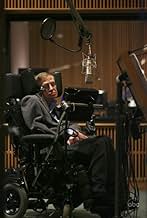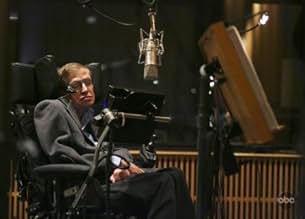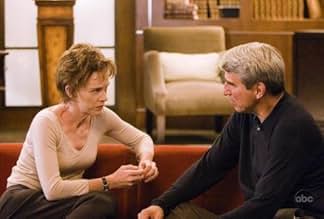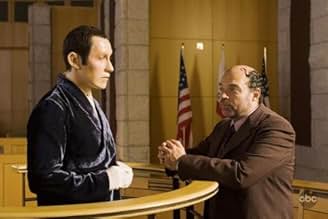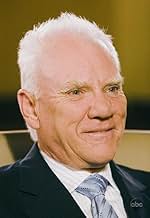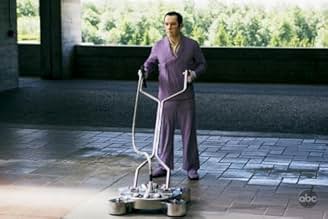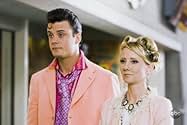Masters of Science Fiction
- TV Series
- 2007
- 42m
IMDb RATING
6.7/10
2.3K
YOUR RATING
"Masters of Science Fiction" was a 2007 hosted science fiction anthology series, hosted by Stephen Hawking."Masters of Science Fiction" was a 2007 hosted science fiction anthology series, hosted by Stephen Hawking."Masters of Science Fiction" was a 2007 hosted science fiction anthology series, hosted by Stephen Hawking.
- Nominated for 1 Primetime Emmy
- 2 nominations total
Browse episodes
Featured reviews
It's so refreshing to get back to a show with some real, pure science fiction. This isn't your "aliens, robots, and spaceships" sci-fi of Star Wars (more properly called space opera), it's not filled with meaningless techno-babble that grabs randomly at today's scientific buzzwords like Star Trek, or your partly supernatural plots of The Outer Limits, but short stories from proved science fiction writers of the past several decades put to film, and so far it's well done.
It doesn't concentrate on special effects, but more the human questions, both spiritual and political, that advances in science or future fortunes force us to answer. That is the type of thinking man's (and woman's) science fiction that made the genre a success in America in the 1950's and when most of the greatest writers, and even the movie plots of today, got their start. It says, "What would YOU do in this situation?" "People can create androids that think. Do you treat them like humans?" Or "Aliens demand we decide whether we trust other nations or risk certain nuclear annihilation. What would you do?" So far the acting has been really good, using first rate movie actors, with the first episode starring Judy Davis, the second Terry O'Quinn, and the third Anne Heche and Malcolm MacDowell.
Unfortunately for the show I've seen a lot of negative comments about it from the self-appointed judges of all that is quality TV since it doesn't fit in the cookie cutter mold made for it by all the previous "science fiction" shows that showcase a lot of large breasted female cyborgs, space dogfights, laser gunfights, and alien forehead prosthetics. Seeking only escapist entertainment, they claim it has politics and real issues, so it must be worthless. I say, if it doesn't have those, what worth is it? But it is the only true science fiction show in recent years, and one that I intend to continue watching closely for as long as it is on.
It doesn't concentrate on special effects, but more the human questions, both spiritual and political, that advances in science or future fortunes force us to answer. That is the type of thinking man's (and woman's) science fiction that made the genre a success in America in the 1950's and when most of the greatest writers, and even the movie plots of today, got their start. It says, "What would YOU do in this situation?" "People can create androids that think. Do you treat them like humans?" Or "Aliens demand we decide whether we trust other nations or risk certain nuclear annihilation. What would you do?" So far the acting has been really good, using first rate movie actors, with the first episode starring Judy Davis, the second Terry O'Quinn, and the third Anne Heche and Malcolm MacDowell.
Unfortunately for the show I've seen a lot of negative comments about it from the self-appointed judges of all that is quality TV since it doesn't fit in the cookie cutter mold made for it by all the previous "science fiction" shows that showcase a lot of large breasted female cyborgs, space dogfights, laser gunfights, and alien forehead prosthetics. Seeking only escapist entertainment, they claim it has politics and real issues, so it must be worthless. I say, if it doesn't have those, what worth is it? But it is the only true science fiction show in recent years, and one that I intend to continue watching closely for as long as it is on.
"From the very beginning, we have wondered how life began, what our purpose is and where we are headed. We have struggled to understand time, matter, the infinite universe, who we are and if we are alone. Great minds have come up with the most wonderful and the most terrifying answers. We invite you to join us on this great journey!" This opening narration by Stephen Hawking is not exactly accurate, because all of the six episodes attempt to answer only one question, and that is where we are headed. The answer is usually the same: Society and Technology will cause the downfall of humans, machines will take over the Earth and the people will annihilate themselves with nuclear weapons. Whatever the case, the next 100-200 years won't be pleasant, according to the Masters.
Masters of Science Fiction gets its title from the authors of the Stories, the episodes are based on. Robert Heinlein, author of the great Sci Fi novel "Stranger in a Strange Land" is represented, as well as John Kessel, Howard Fast, Walter Mosley, Harlan Ellison and Robert Sheckley. The truth is, the ideas of the episodes are always extremely good. Creativity and Originality can be found in all of the six episodes, but while some have very interesting plots, others are quite dull, and lack exciting scenes and dialog.
Even though, the series features some great actors, most of them are terribly underused. Sam Waterston, Terry O'Quinn and John Hurt are the only ones, who get to use their talent in a large number of scenes, while Judy Davis, James Cromwell, Brian Dennehey, Sean Astin and especially Malcolm McDowell shine in the scenes they have, but often make very short or badly written appearances.
Now as far as the individual episodes are concerned, I will go from the worst to best. By far the biggest disappointment was "Watchbird", especially because it had great potential due to the actors (Sean Astin and James Cromwell) and some good ideas (computer birds, who are programmed to attack anyone with the intentions to kill someone). But the whole plot just drags along and the end does not satisfy the viewer.
"Little Brother" is not exactly bad, but in my opinion horribly written. To have computers as the judges in the future índeed was a great idea, but like Watchbird, a lot of potential was wasted, due to overlong scenes. Clifton Collins, Jr. acts quite well given the terrible script.
"The Awakening" now can actually be called good. The writing was all right and Terry O'Quinn once again proves what a wonderful actor he is. But the political message was just a little too extreme, that all countries are willing to lay down their arms, except the United States. That might actually reflect reality to a certain extent, but this was definitely exaggerated.
Now, as for "The Discarded", that episode was quite a treat. John Hurt is perfectly cast in his role, on a ship full of disfigured people, who are suffering from RIGGUM. The message might seems a little extreme, but we do live in a society, where people do everything to be perfect and I don't think this future is too far fetched. The only flaw of the episodes is once again, that some scenes are a little dull.
Heinlein's "Jerry was a Man" starrs a great Malcolm McDowell and Anne Heche, who plays the seventh richest woman in the world. When she finds out that Tibur Cargrew and his company create humanoids, with a limited brain capacity, to do dangerous or unpleasant jobs, she feels sorry for them and even adopts one of them. A fierce legal battle erupts, as to whether Jerry, a humanoid, has feelings and should be considered a man.
Last, but certainly not least "A Clean Escape" is in my opinion the highlight of the series. A woman, interrogating a man in a room might not sound too interesting at first but the shocking ending and the great acting by Judy Davis and especially Sam Waterston make this episode entertaining, gripping and does not leave us cold after the ending.
In conclusion, I do recommend the series to people who like Science Fiction, but I would rent the DVD. True, the episodes are not everyone's taste and some of them are quite mediocre.
Masters of Science Fiction gets its title from the authors of the Stories, the episodes are based on. Robert Heinlein, author of the great Sci Fi novel "Stranger in a Strange Land" is represented, as well as John Kessel, Howard Fast, Walter Mosley, Harlan Ellison and Robert Sheckley. The truth is, the ideas of the episodes are always extremely good. Creativity and Originality can be found in all of the six episodes, but while some have very interesting plots, others are quite dull, and lack exciting scenes and dialog.
Even though, the series features some great actors, most of them are terribly underused. Sam Waterston, Terry O'Quinn and John Hurt are the only ones, who get to use their talent in a large number of scenes, while Judy Davis, James Cromwell, Brian Dennehey, Sean Astin and especially Malcolm McDowell shine in the scenes they have, but often make very short or badly written appearances.
Now as far as the individual episodes are concerned, I will go from the worst to best. By far the biggest disappointment was "Watchbird", especially because it had great potential due to the actors (Sean Astin and James Cromwell) and some good ideas (computer birds, who are programmed to attack anyone with the intentions to kill someone). But the whole plot just drags along and the end does not satisfy the viewer.
"Little Brother" is not exactly bad, but in my opinion horribly written. To have computers as the judges in the future índeed was a great idea, but like Watchbird, a lot of potential was wasted, due to overlong scenes. Clifton Collins, Jr. acts quite well given the terrible script.
"The Awakening" now can actually be called good. The writing was all right and Terry O'Quinn once again proves what a wonderful actor he is. But the political message was just a little too extreme, that all countries are willing to lay down their arms, except the United States. That might actually reflect reality to a certain extent, but this was definitely exaggerated.
Now, as for "The Discarded", that episode was quite a treat. John Hurt is perfectly cast in his role, on a ship full of disfigured people, who are suffering from RIGGUM. The message might seems a little extreme, but we do live in a society, where people do everything to be perfect and I don't think this future is too far fetched. The only flaw of the episodes is once again, that some scenes are a little dull.
Heinlein's "Jerry was a Man" starrs a great Malcolm McDowell and Anne Heche, who plays the seventh richest woman in the world. When she finds out that Tibur Cargrew and his company create humanoids, with a limited brain capacity, to do dangerous or unpleasant jobs, she feels sorry for them and even adopts one of them. A fierce legal battle erupts, as to whether Jerry, a humanoid, has feelings and should be considered a man.
Last, but certainly not least "A Clean Escape" is in my opinion the highlight of the series. A woman, interrogating a man in a room might not sound too interesting at first but the shocking ending and the great acting by Judy Davis and especially Sam Waterston make this episode entertaining, gripping and does not leave us cold after the ending.
In conclusion, I do recommend the series to people who like Science Fiction, but I would rent the DVD. True, the episodes are not everyone's taste and some of them are quite mediocre.
10FlorisV
The best short stories in sci fi found a place in this show, though only for a short while, and a remarkable show it is. The stories are generally well picked: fascinating, though with more of an emphasis on the human condition than on a sense of wonder.
Each episode has it's own tone: dark or bleak, satirical or serious, philosophical or mystical. The acting so far has been outstanding. The show has a lot of similarities with The Outer Limits which I also adore but really that show had strong episodes countered by weak ones. Here, it's six episodes (two never aired) that are all not only very entertaining but also very memorable.
I must say Stephen Hawking's voice doing the intro's and outro's doesn't add much, because of two reasons: his voice is simply not very personal since it's purely mechanical and really he's just saying what we already get to see in the beginning of episodes or what we got to see at the end, making conclusions and asking questions that are already in our minds by watching the show. Because it's an intelligent show and despite each episode being stand alone, it offers far more depth than most other sci fi shows and that is not an easy feat.
Two thumbs up and again, what a shame to see a genuinely good show go. Oh, the fate of most great sci fi shows...it would be insufferable if there weren't so many other shows worth watching.
Each episode has it's own tone: dark or bleak, satirical or serious, philosophical or mystical. The acting so far has been outstanding. The show has a lot of similarities with The Outer Limits which I also adore but really that show had strong episodes countered by weak ones. Here, it's six episodes (two never aired) that are all not only very entertaining but also very memorable.
I must say Stephen Hawking's voice doing the intro's and outro's doesn't add much, because of two reasons: his voice is simply not very personal since it's purely mechanical and really he's just saying what we already get to see in the beginning of episodes or what we got to see at the end, making conclusions and asking questions that are already in our minds by watching the show. Because it's an intelligent show and despite each episode being stand alone, it offers far more depth than most other sci fi shows and that is not an easy feat.
Two thumbs up and again, what a shame to see a genuinely good show go. Oh, the fate of most great sci fi shows...it would be insufferable if there weren't so many other shows worth watching.
I don't leave comments very often, but felt compelled to do so to give some counterpoint to very negative comments.
It seems that you will either love or hate the series, and few people are indifferent in the sense that they rate it average.
Such is the case with my rating: 9 out of 10, mostly because the "Masters" is different and tries to go deeper. The fact that ABC discontinued the show after 4 episodes is either a good or a bad sign, depending on your viewpoint.
These are not stories that we have become used to where Science-Fiction is concerned. Obviously, for me, that is a good thing. These stories focus more on characters and character development, in the tradition of the great SF-writers of the sixties, and the casting is excellent - on the whole we have good acting from good actors to support the story, an absolute must in stories which rely on it.
I fear we will see nothing more than the 6 episodes I know at the moment I write this. It's a shame, but I'll content myself with stories published in the great SF-magazines.
In summary, probably only for a particular brand of Science-Fiction fans.
It seems that you will either love or hate the series, and few people are indifferent in the sense that they rate it average.
Such is the case with my rating: 9 out of 10, mostly because the "Masters" is different and tries to go deeper. The fact that ABC discontinued the show after 4 episodes is either a good or a bad sign, depending on your viewpoint.
These are not stories that we have become used to where Science-Fiction is concerned. Obviously, for me, that is a good thing. These stories focus more on characters and character development, in the tradition of the great SF-writers of the sixties, and the casting is excellent - on the whole we have good acting from good actors to support the story, an absolute must in stories which rely on it.
I fear we will see nothing more than the 6 episodes I know at the moment I write this. It's a shame, but I'll content myself with stories published in the great SF-magazines.
In summary, probably only for a particular brand of Science-Fiction fans.
It's not different by much, except it's not nearly as good. The pre-show hype from ABC was that it was the best series since the TWILIGHT ZONE. They must have been writing that hyperbole with their heads in the Twilight Zone.
The narrator is Stephen Hawking, using his quasi-mechanical voice, but otherwise just like an Outer Limits episode. That isn't terrible in itself, but certainly not original.
The opening and titles sequences are modernized with fancy graphics, etc, otherwise they are similar. Narration ends with a warning or social observation, similar to Outer Limits, yet more heavy-handed.
The first episode shown was obviously the program's producers and writers attempt at topical political statement, and as such it was ham-fisted and preachy, and ludicrous as well, and about as topical as the Berlin wall. The recent Outer Limits series also had a political bent, yet was often more subtle and earnest in presentation.
This initial episode quickly became predictable, and ultimately boring, and showed a surprisingly limited range for actor Sam Waterston, who easily can be much better. Judy Davis was good here yet not nearly as good as she can be.
Don't believe the ABC promo baloney, and remind yourself that this is the same network that trashed Kolchak:The Night Stalker with that loser remake of a fine series.
Episode 2: Viewing of the second episode ultimately left the same impression as the first. While initially promising, and a much better use of actors and a wider, a more involved setting, this episode succumbed to the same preachy, heavy-handed political dogma that marred the first one. In fact, this episode was less subtle, more absurd and more strident in it's denouncement of US policy, as well as naive and unrealistic about other nations' motives. (My more detailed commentary is available under the specific episode title, and those who wish to vote negatively for political reasons should do so there)
Episode 3: A social statement of intrinsic value, yet not truly interesting nor captivating. Did not dislike it, but did not find that it really captured effectively the modern pop-culture mentality it mocked. The same material has been handled better in other series, but of episodes 1, 2 and 3, this one had more worthiness. Unfortunately, a great Twilight Zone was being shown on another channel about a man who is becoming "nobody" to all around him, and that amplified the weaknesses of this series.
Episode 4: The best of the four episodes takes the series to 'where it has not been before', meaning a decent and above average effort. Maintains the emphasis on commentary, this time it is more social than political, and is much less strident and dogmatic, and hence plays well. This rather thoughtful and well-acted episode causes me to raise my overall vote by two points. The only problem is that the ending is rather vague, and could have been more distinct, but it's a satisfactory episode regardless. The best was saved for last.
The narrator is Stephen Hawking, using his quasi-mechanical voice, but otherwise just like an Outer Limits episode. That isn't terrible in itself, but certainly not original.
The opening and titles sequences are modernized with fancy graphics, etc, otherwise they are similar. Narration ends with a warning or social observation, similar to Outer Limits, yet more heavy-handed.
The first episode shown was obviously the program's producers and writers attempt at topical political statement, and as such it was ham-fisted and preachy, and ludicrous as well, and about as topical as the Berlin wall. The recent Outer Limits series also had a political bent, yet was often more subtle and earnest in presentation.
This initial episode quickly became predictable, and ultimately boring, and showed a surprisingly limited range for actor Sam Waterston, who easily can be much better. Judy Davis was good here yet not nearly as good as she can be.
Don't believe the ABC promo baloney, and remind yourself that this is the same network that trashed Kolchak:The Night Stalker with that loser remake of a fine series.
Episode 2: Viewing of the second episode ultimately left the same impression as the first. While initially promising, and a much better use of actors and a wider, a more involved setting, this episode succumbed to the same preachy, heavy-handed political dogma that marred the first one. In fact, this episode was less subtle, more absurd and more strident in it's denouncement of US policy, as well as naive and unrealistic about other nations' motives. (My more detailed commentary is available under the specific episode title, and those who wish to vote negatively for political reasons should do so there)
Episode 3: A social statement of intrinsic value, yet not truly interesting nor captivating. Did not dislike it, but did not find that it really captured effectively the modern pop-culture mentality it mocked. The same material has been handled better in other series, but of episodes 1, 2 and 3, this one had more worthiness. Unfortunately, a great Twilight Zone was being shown on another channel about a man who is becoming "nobody" to all around him, and that amplified the weaknesses of this series.
Episode 4: The best of the four episodes takes the series to 'where it has not been before', meaning a decent and above average effort. Maintains the emphasis on commentary, this time it is more social than political, and is much less strident and dogmatic, and hence plays well. This rather thoughtful and well-acted episode causes me to raise my overall vote by two points. The only problem is that the ending is rather vague, and could have been more distinct, but it's a satisfactory episode regardless. The best was saved for last.
Did you know
- ConnectionsSpin-off from Masters of Horror (2005)
- How many seasons does Masters of Science Fiction have?Powered by Alexa
Details
- Release date
- Countries of origin
- Official site
- Language
- Also known as
- Stephen Hawking's Sci Fi Masters
- Filming locations
- Production companies
- See more company credits at IMDbPro
Contribute to this page
Suggest an edit or add missing content



